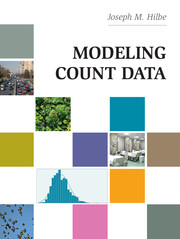Book contents
- Frontmatter
- Contents
- Preface
- Chapter 1 Varieties of Count Data
- Chapter 2 Poisson Regression
- Chapter 3 Testing Overdispersion
- Chapter 4 Assessment of Fit
- Chapter 5 Negative Binomial Regression
- Chapter 6 Poisson Inverse Gaussian Regression
- Chapter 7 Problems with Zeros
- Chapter 8 Modeling Underdispersed Count Data – Generalized Poisson
- Chapter 9 Complex Data: More Advanced Models
- Appendix: SAS Code
- Bibliography
- Index
Chapter 3 - Testing Overdispersion
Published online by Cambridge University Press: 05 August 2014
- Frontmatter
- Contents
- Preface
- Chapter 1 Varieties of Count Data
- Chapter 2 Poisson Regression
- Chapter 3 Testing Overdispersion
- Chapter 4 Assessment of Fit
- Chapter 5 Negative Binomial Regression
- Chapter 6 Poisson Inverse Gaussian Regression
- Chapter 7 Problems with Zeros
- Chapter 8 Modeling Underdispersed Count Data – Generalized Poisson
- Chapter 9 Complex Data: More Advanced Models
- Appendix: SAS Code
- Bibliography
- Index
Summary
Some Points of Discussion
• How is overdisperion recognized?
• What are some of the foremost tests to determine whether a Poisson model is overdispersed?
• What is scaling? What does it do to a count model?
• Why should robust standard errors be used as a default?
• What is a quasi-likelihood model?
This chapter can be considered a continuation of Chapter 2. Few real-life Poisson data sets are truly equidispersed. Overdispersion to some degree is inherent in the vast majority of Poisson data. Thus, the real question deals with the amount of overdispersion in a particular model – is it statistically sufficient to require a model other than Poisson? This is one of the foremost questions we address in this chapter, together with how we assess fit and then adjust for the lack of it.
Basics of Count Model Fit Statistics
Most statisticians consider overdispersion the key problem when considering count model fit. That is, when thinking of the fit of a count model, an analyst typically attempts to evaluate whether a count model is extradispersed – which usually means overdispersed. If there is evidence of overdispersion in a Poisson model, the problem then is to determine what gives rise to it. If we can determine the cause, we can employ the appropriate model to use on the data.
Analysts have used a variety of tests to determine whether the model they used on their data actually fits.
- Type
- Chapter
- Information
- Modeling Count Data , pp. 74 - 107Publisher: Cambridge University PressPrint publication year: 2014
- 2
- Cited by



